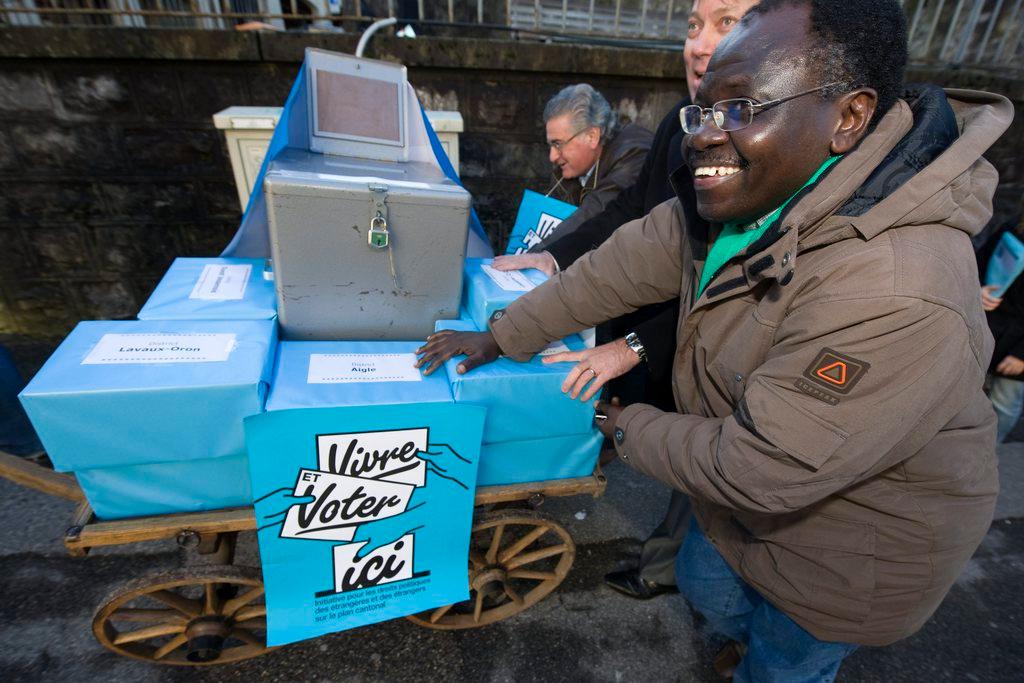Do strict citizenship laws help or hurt integration?

Elif* and Emre* have lived in Switzerland for 12 years, but a law that pushes for better-integrated new citizens has put on hold their dream of becoming Swiss anytime soon. Some say the legislation goes too far, actually achieving the opposite effect.
In 2004, Elif* and Emre* knew they needed to leave Turkey quickly. He says that the last of several trips to prison ended with threats against his family, so they went underground and hitched a ride west with a contact who was part of their network of democracy activists. When the truck stopped, they found themselves in Switzerland as political asylum seekers.
Nine years later, both of them had found jobs at a home for the blind near the Swiss capital. They had been financially independent for two years, and a report from their social worker described them as having “good German skills” and “a broad social network in Switzerland”. Meanwhile, a campaign was underway in their home canton of Bern to make anyone who has received social aid money in the past decade ineligible for Swiss citizenship – unless they paid it back.
After voters passed the measure in November 2013 with 55.8% support, its primary initiator Erich Hess of the conservative right Swiss People’s Party said he was “greatly satisfied” with the result since it addressed a “growing discomfort about many naturalisation cases” among people in Bern.
‘Unlucky’
About a year after Hess’s measure became law, Elif headed to their cantonal migration office to ask about citizenship. She and Emre hadn’t quite been in Switzerland 12 years – the minimum residence requirement for naturalisation – but they wanted to make sure they had everything they needed to apply the moment that day came.
“Becoming citizens was always our goal,” explains Elif. Although they had followed the news and knew about the recently passed law in Bern, she and her husband went to their appointment hoping there would be a way forward for them anyway.
But they were soon sent to the finance department to address their debts – CHF56,050.80 ($55,051.62) in social aid money that they had received from the Swiss government before they found stable employment.
The couple’s situation is nothing new for Francesca Chukwunyere, head of a consultation service for foreigners in Bern called ISA. She’s often confronted with questions about the law behind it.
“We were just unlucky that we ended up being sent to Bern.” – Elif, Swiss citizenship applicant
“It’s led to fewer people trying to become citizens,” she says. And she’s noticed another consequence: “a feeling among people that they don’t have any chance of being accepted here anyway, and so they pull back and stay in their own communities”.
That, she points out, goes against the country’s integration strategy of trying to prevent so-called “parallel societies” from forming. Such societies were a frequent talking point for parliamentarians debating the country’s law on foreigners this year, with Tiana Moser of the centre-right Liberal Green party arguing that “we want diversity in Switzerland, but no parallel societies”.
After Elif and Emre realised that paying back their social aid debt was impossible, they say they felt “demotivated” and “pessimistic” about ever truly becoming part of Swiss society.
“We were just unlucky that we ended up being sent to Bern,” Elif reflects. Her family will now have to wait until 2021 to apply for citizenship because of the law’s 10-year debt clause. After that, it will likely be another three years or more before – and if – it is granted. That long waiting period in Bern is due in part to paperwork involved with Hess’s legislation, according to a recent report in the Berner Zeitung newspaper.
“I’m disappointed that this law even exists,” Elif says. “I don’t generally feel foreign here, but it makes me feel like an outsider.”
Job training, but at what cost?
Elif and Emre’s story
The couple tried to find work almost immediately after arriving in Switzerland but soon learned that their status as asylum seekers did not allow them to be employed or even buy a SIM card for their mobile phones in order to contact potential employers.
Elif gave birth to their daughter, and migration authorities placed them in several apartments in canton Bern before they eventually received refugee status and exited the asylum system. With limited ability to work beforehand, they immediately became reliant on social aid.
After many attempts to find work as a librarian or teacher – his profession in Turkey – Emre found an internship at the home for the blind where he now works. Elif, who has a degree in child psychology, took a job as a substitute child care worker. Their minimal and sporadic incomes continued to be supplemented by social aid until 2011, when both found steady work.
Their story resonates with Sophie Müller, a social aid worker in Wattenwil, canton Bern. “People who come out of the assistance period for asylum seekers are more likely to be dependent on social aid money for longer, especially if they’re not minors or at an age where they can seek an apprenticeship,” she says.
More and more options are being developed for refugees and older immigrants to receive job training through apprenticeships and internships like the one Emre found. But Chukwunyere has found those offerings to be fraught with pitfalls, especially for people who don’t want to take social aid money.
“You take a 35-year-old who probably already has some qualifications in their home country and place them at a point where you place a 16-year-old here,” she says.
“The training can take two to four years, and in that time you can’t live off of the money you earn in those positions. That means you become dependent on social welfare again.”
Climbing the permit ladder
Since permit and citizenship laws have become tied to social aid money, both Müller and Chukwunyere have worked with people who try to avoid taking such payments because they know the consequences.
“They would definitely be eligible for social aid and are considered working poor. But they don’t want the support anymore – and what does that mean for their children?” Chukwunyere wonders.
Müller mostly sees the laws affecting young immigrants who have no choice but to take social aid money when they become adults because their families depended on it throughout their childhood.
Usually, those young people aren’t after citizenship – at least not right away – but they do want to get a residence permit that gives them a better chance on the job market in Switzerland. To get a better permit, they also have to prove they’re not getting social aid and pay it back in some cases – nearly impossible for young people just starting out on their own.
“Those with certain types of permits aren’t eligible for scholarships, so they’re forced to take social aid money at age 18,” Müller explains. “Unless they don’t do an apprenticeship and look for a job right away, but that’s not what’s generally encouraged in Switzerland.”
“It is a big goal for young immigrants to get another type of permit,” Müller says. “And you’re taking some hope away from them if you tell them that it will be more difficult to get that permit if they take social aid money.”
More laws
Although Elif and Emre feel discouraged that they will have to wait nearly another decade to become Swiss, they say they’ll wait it out and fight for the law to be repealed in the meantime.
But political winds may be blowing against them, with similar laws being debated or in place in other cantons such as Uri, Basel City and Aargau. And the new national citizenship law, which will come into force in 2018, will have a similar effect because it requires applicants for naturalisation to have a permanent residence permit, generally only obtainable for those who pay off their social aid debts.
Meanwhile, the number of citizenship applications in canton Bern have increased again after having fallen off considerably following the approval of Hess’s law.
“I’m sure there would have been even more applications without the law,” Hess said of the rebound in Bern’s Der Bund newspaper, adding that his party advocates for quality and not quantity when it comes to citizenship and that today’s citizens are better integrated as a result.
But Chukwunyere wonders where that leaves the quarter of the Swiss population without a passport.
“Research shows that a person only feels at home when they can participate,” Chukwunyere points out. “Here you can only fully participate if you are Swiss. But if you hang the fruit so high that everyone knows they can’t reach it, then you’re achieving the opposite of integration.”
*Not their real names

In compliance with the JTI standards
More: SWI swissinfo.ch certified by the Journalism Trust Initiative













You can find an overview of ongoing debates with our journalists here . Please join us!
If you want to start a conversation about a topic raised in this article or want to report factual errors, email us at english@swissinfo.ch.